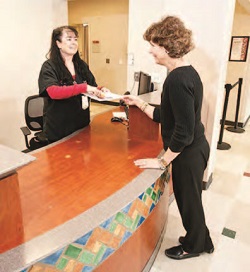We understand that any medical situation that involves a trip to the emergency room can be frightening and overwhelming. That’s why it’s our goal to do everything possible to provide you with as much information as possible regarding what to expect during your visit.
 Arrival and Triage
Arrival and Triage
Upon arrival in the Emergency department, the triage nurse at the welcome desk will assess your condition and evaluate the urgency of your medical needs. All of our patients are treated as if they are emergent; however, those with the most life-threatening illnesses and injuries are cared for first – this process is called triage. As part of the medical assessment, the triage nurse will take your vital signs and ask about your condition and medical history. This information will help the care team to prioritize your care appropriately.
While you are triaged by the nurse, a business office representative will begin setting up your hospital medical record by getting simple information such as your full name and date of birth.
Communication and Wait Times
Please be assured that we do everything possible to treat each of our patients safely, efficiently and quickly. However, those patients with the most life threatening conditions must be cared for first. This could mean that someone who arrives after you is treated before you.
At a Level I trauma center in a community the size of the Greater Houston area, the number of patients that are waiting for care and the severity of their illnesses or injuries can change very quickly and is quite unpredictable. Unfortunately, this can make it difficult to provide an exact estimate for wait times. Depending upon the number of patients in the Emergency department, the severity of their condition, the number of tests required, and multiple other factors, wait times can sometimes last more than several hours. To reduce wait times, our hospital has created the Rapid Treatment Area (RTA) – a dedicated treatment area for less acute emergencies.
If you are asked to wait, please know that we are committed to making you as comfortable and informed as possible. The triage desk will communicate with you regularly regarding your estimated wait time, but if you start to feel worse during your wait, please let the triage nurse know immediately.
Diagnosis and Treatment
Once you are taken to a treatment room, a nurse will assess you and may ask for further information about your medical history. Because we serve as the primary teaching hospital for McGovern Medical School at The University of Texas Health Science Center at Houston (UTHealth), you may be seen by a fellow, intern, resident or medical student, who will examine you and discuss your care with your attending physician (also known as your primary physician). Your attending physician is responsible for overseeing your care during your stay and will order any necessary tests and work with you to make all decisions about your treatment.
Diagnostic tests you may undergo could include an X-ray, ultrasound, CT scan, MRI and/or lab tests on your blood. Most of these tests are either performed at the bedside or in our Radiology department, located within the Emergency department.
Based on the results of any tests and your attending physician’s diagnosis, you will either be treated and discharged with instructions for caring for yourself at home, or you will be admitted to the hospital.
If You are Admitted
If your physician thinks you need further care or observation, you may be admitted to the hospital. Once the physician submits admission orders, the Admissions department will begin the work to assign you to a room. Your nurse will keep you informed about any wait times and will keep you as comfortable as possible.
If You Are Discharged
Once your diagnosis and treatment are complete, your physician will write orders for your discharge. Before you leave, your nurse will talk with you about follow-up care, including medications, diet and how to care for yourself at home. We are here to help and care about your health and wellbeing, so if you have questions or concerns, please be sure to ask.
Interpreters
The Interpreter Services department is available at no cost 24 hours a day to provide or arrange for interpreters to assist hearing impaired and limited English proficiency patients and staff in multiple languages, including American Sign Language. If you require an interpreter, please let the triage nurse know.
